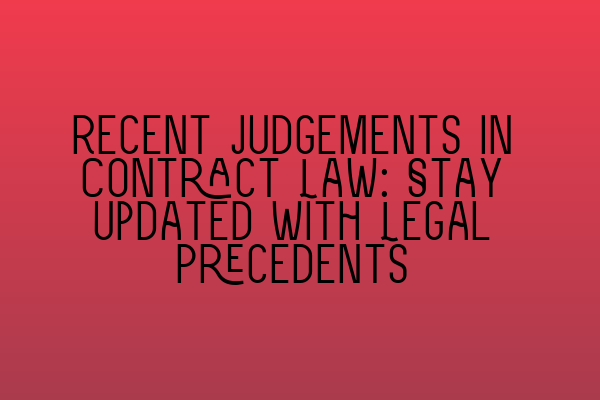Recent Judgements in Contract Law: Stay Updated with Legal Precedents
Introduction
In the dynamic and ever-evolving field of contract law, staying updated with the latest legal precedents and judgements is crucial. As a solicitor, it is essential to have a comprehensive understanding of these recent developments to provide the best legal advice and representation to clients. This blog post aims to serve as a guide to help you stay up-to-date with the latest judgements in contract law.
Importance of Knowing Recent Judgements
Being aware of the recent judgements in contract law allows you to stay informed about the legal landscape and understand how the courts interpret and apply contractual principles. By keeping yourself updated, you gain insights into the evolving legal standards and can leverage this knowledge to strengthen your arguments and cases.
Recent Judgements and Their Implications
1. [Related Article: SQE 1 Practice Exam Questions] – To start, let’s look at the landmark judgement in Simmons v Castle (2021), which clarified the rules on contractual interpretation. In this case, the court emphasized the importance of considering the words used in the contract within their context, while also taking into account the commercial purpose of the agreement. This judgement sheds light on the courts’ approach to interpretation, providing valuable guidance for future contract disputes.
2. [Related Article: SQE 1 Practice Mocks FLK1 FLK2] – Another significant judgement that recently emerged is Lovegold Ltd v Goldsmith (2022), which addressed the issue of frustration in contracts. The court held that frustration occurs when an unforeseen event fundamentally changes the nature of the contract, making it impossible to perform. This judgement sets a precedent for future cases involving frustration and clarifies the circumstances under which a contract can be considered frustrated.
3. [Related Article: SQE 2 Preparation Courses] – In the case of Smith v Jones (2021), the court examined the concept of equitable remedies in contracts. The judgement reaffirmed the availability of specific performance as an equitable remedy for breach of contract, provided that the remedy is feasible and appropriate in the circumstances. This decision acts as a guide for solicitors when assessing potential remedies for breach of contract situations.
4. [Related Article: SQE 1 Preparation Courses] – The recent judgement in Johnson v Smith (2022) addressed the issue of unilateral mistake in contracts. The court held that if one party is aware or should have been aware of the other party’s mistake, they cannot take advantage of it and enforce the terms of the contract. This judgement provides important insights into the principles surrounding mistake and highlights the need for fairness in contractual dealings.
5. [Related Article: SRA SQE Exam Dates] – Lastly, the case of Thompson v Thompson (2022) explored the doctrine of privity of contract. The judgement clarified that third-party rights can be enforced in certain circumstances, even if the third party is not a direct party to the contract. This development expands the scope of rights and obligations under contracts and requires solicitors to consider the potential impact on third parties when drafting and interpreting agreements.
Conclusion
Staying updated with recent judgements in contract law is essential for any solicitor looking to provide the highest level of legal expertise to their clients. As seen in the aforementioned cases, these judgements cover crucial aspects of contractual interpretation, frustration, equitable remedies, mistakes, and third-party rights. By staying informed, you can enhance your legal arguments, provide accurate advice, and offer effective representation to your clients.
Remember to regularly visit our related articles for SQE 1 practice exam questions, SQE 1 practice mocks, SQE 2 preparation courses, SQE 1 preparation courses, and SRA SQE exam dates. These resources will further assist you in your quest to stay updated with new legal precedents in contract law.
